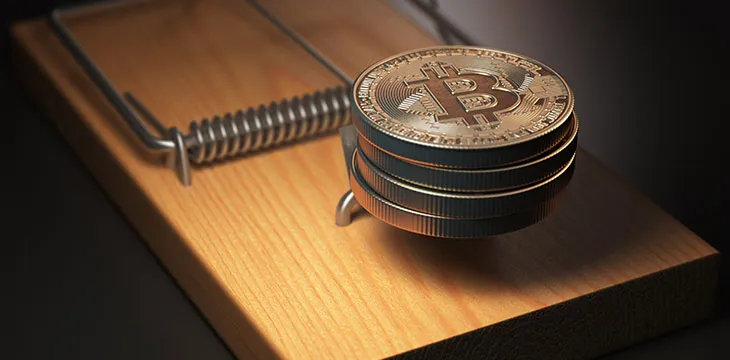|
Getting your Trinity Audio player ready...
|
In anticipation of the Bitcoin Cash hard fork last week, two cryptocurrencies were launched—BCHABC and BCHSV. Each corresponded to one of the two camps that were pushing BCH’s divide, but only one has the potential to be considered a fraudulent pump-and-dump scheme—BCHABC.
Medium user “Without Fear” provides a considerable amount of data to support that belief in a recent thread on the social media platform. Before anyone goes off the deep end and accuses Without Fear of being nothing more than a puppet for BCHSV, it would be in their best interest to read the post and understand better the scenario.
Without Fear points out that, prior to the hard fork, “[W]e have hash that wasn’t mining BCH before the fork, which means that (without looking at it) this is either pragmatic hash that makes money by selling the ABC coins they mine, or hash rented by the people who wanted or believed in the ABC ruleset. However it became clear after the following announcement by Bitcoin.com that a lot of the hash that would mine BCHABC the day of the fork would be stolen hash from Bitcoin.com pool miners.”
The author goes on to show that there have been a number of mining pools that have stolen hash from their customers in order to point them to BCHABC proponent Bitcoin.com, including Antpool, viaBTC and BTC.TOP, creating a pool that post’s author refers to as BABV. This hash, asserts Without Fear, is unstable and is being mined against the market’s wishes—it is forced hash.
He also shows how the Kraken exchange is trying to manipulate public sentiment. Kraken is backed by Bitcoin.com’s Roger Ver and recently stated that it will support BCHSV, but warned that Bitcoin SV “should be seen as an extremely high risk investment, citing several “red flags”: BCHSV has no wallets that support replay protection, it has no support in major block explorers and because miners are subsidized or operating at a loss, among others. This is a blatant disregard of the facts and a manipulation of the truth. Neither BCHSV nor BCHABC offer replay protection and BCHSV most definitely has support in block explorers. There is no evidence to support the fact that BCHSV miners are being subsidized, whereas Without Fear provides several examples of how BCHABC is subsidized. Ver himself has even admitted to it, telling CoinGeek’s Calvin Ayre that Bitcoin.com can subsidize BCHABC with 4000 petahashes for a decade.
So, where does this leave us? BABV is a pool that is creating hash that is supposed to be mined elsewhere, but whose components have been pointed by the pool operators—not the miners—to mine BCHABC in an attempt to signal market strength. As Without Fear correctly ascertains, “However, this is not real demand, the machine owners never asked or consented to mine BCHABC. This is being done behind their back while they are paid as if machines are mining BTC, or whatever is most profitable.”
In the absence of true market demand, the forced hash will revert to its original source and BCHABC will, by default, stop progressing. Explains Without Fear, “Considering that ABC hash support was 800 when the BCH price was around $500 and that the current BCHABC price is less than $300, such plunge in hash would spiral out of control and lead to a full halt in what these exchanges have labelled as the “BCH” chain. The portfolios of people who held BCH before the fork would now be worth zero while the BCHSV chain keeps being mined.”
Without Fear’s advice is simple and insightful: “[S]teer clear of exchanges that try to sell ABC as ‘BCH’ as ABC is extremely unstable and not comparable to your BCH holdings.”

 07-06-2025
07-06-2025 





